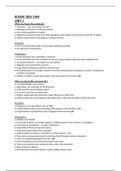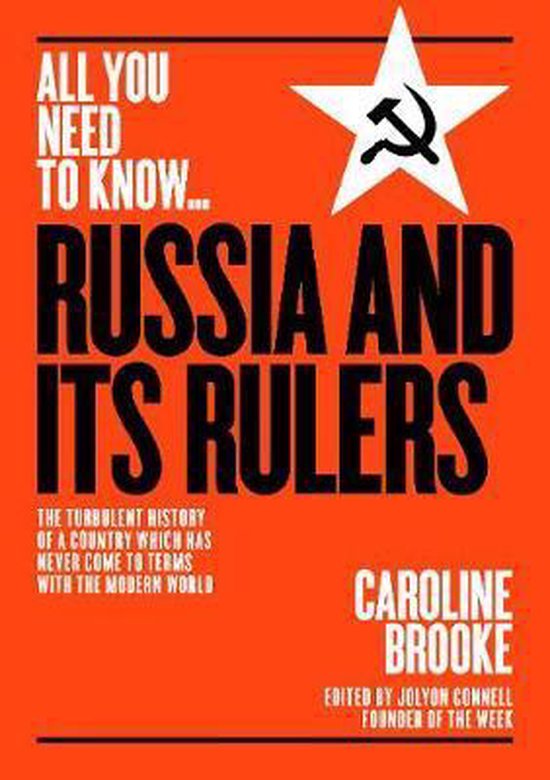RUSSIA 1855-1964
UNIT 1
What was Russia like politically?
• Autocracy - Tsar was chosen by God
• Ideology reinforced by Orthodox Church
• Very small population of nobles
• Majority of country made up of serfs (peasants) who support the very small minority in power
• Nobles receive land in exchange for ruling provinces
Strengths:
• The Tsar held all the power and everyone looked up to him
• He ruled how he wanted to
Weaknesses:
• Divide between Tsar and Nobles, and Serfs
• Communication was slow between provinces, many ministers did what they wanted to do
• Corrupted ministers - tax intake was not honest
• Majority of country lived in poverty
• Large distance between provinces and the Tsar
• No infrastructure or transport system in Russia, moving armies and goods around is complicated
and time consuming
• Reliant on nobles to look after regions, he must trust them to do it right
What was Russia like economically?
• Overwhelmingly rural country
• Agriculture was mainstay of the economy
• Grain was the most valuable export
• Serfs work and live on nobles land
• Nobles could trade serfs and had a huge influence on their lives
• Half the week the serf worked on the nobles land, other half of week on their own land
Strengths:
• Produced 1/3 of the world’s iron in 1800
• Cotton industry used new technology, fifth largest in the world by 1850
• Large number of people they have is biggest economic strength
Weaknesses:
• Industry was limited
• Protected by duties on foreign imports, so little pressure from overseas’ competitors
• Government monopolies - complex restrictions
• Impossible to finance large enterprise
• State and private banks were unstable
• Little incentive to invest in machinery to reduce labour costs
• There was no group interested in enriching itself through business enterprise
• Costs of transporting goods were very high
• Communications were poor and transport was slow
• Towns and markets were administrative rather than industrial
• Slow growth of railways
• Serfs are born into their lifestyle, social mobility doesn't exist
, What was Russia like socially?
Strengths:
• No capital punishment, it was forbidden, serfs were property and so were needed for work.
• Serfdom supports nobles and keeps them wealthy and powerful
• Serfs worked for nobles to ensure they can pay rent and buy food
• Religion had a large role in serf life
• Village organisation, mir made up of village elders - they helped with land distribution and food
shortages
Weaknesses:
• Structure of society hadn't changed since previous century
• Unequal treatment
• Tsar and his wife were prone to revolution because of their minority
• Serfs had restricted lifestyle and were vulnerable to being sold off
• No middle class, large separation between rich and poor
• Serfs prone to conscription, serving terms of 25 years
• Life expectancy is very low
• Poor working conditions
Alexander II:
• Reigns from 1855-1881
What were the major reforms of Alexander II’s reign?
• Struggles, as the Tsars want to keep autocracy but also modernize Russia
AREAS OF REFORM CHANGE TO RUSSIA BENEFITS WEAKNESSES
Serfs • On 19 February 1861, • Peasants were no longer • Nobles began to dispose of
Alexander II signed the forced to work for their serfs by giving them to
Emancipation Act in which nobles on their land the army or moving them to
serfs settled on estate poor lands
owners’ landed property • Serfs had to pay communal
was abolished forever taxes and heavy
redemption payments to
the state
Political/ • The creation of the first • Made local • The wealthy and titled had
Government elected local governments administration more more voting power and
(Zemstvos) efficient those who payed taxes had
• As well as assemblies at local • Encouraged hopes and a greater representation
level, there were also demand for greater (tilted towards nobles)
provincial assemblies and change • No intention for political
urban councils • There to make development
improvements • Tsar was routed in autocracy,
• Fair as they were elected so Zemstvos helped him
control the land
Law/Judiciary • Reorganisation of local and • No equality before law • Flogging was retained as a
regional courts reforms punishment
• Judiciary was more • Bribery was reduced by • Censorship and crimes
independent of the state paying judges better against the state were not
• Higher courts were also wages included in the system -
reorganized • More modern laws cases only heard by judges
, • Huge reform of criminal trial who were not independent
by jury
Education • Literate workforce with • Rise in opposition against • Restricted curriculum based
greater technical skills was the Tsar, who criticized on classical studies imposed
needed his autocracy and due to fears of student
• A number of reforms were trying to convince radicalism
introduced into Universities others to rebel against • Moves towards science were
and a Charter for the government discouraged as it was
Secondary education • Plants the seed for associated with liberalism
• Censorship was lifted, books revolution and irreligion
and newspapers were • Inspectors appointed to keep
allowed. Students exposed a close eye on primary
to radical ideas about schools to prevent
science and government disrespect for authority
from foreign books • Only basic education (from
• Science was allowed at first, the Church) in villages
but it went against what organized by the mir.
the Church said
Military • Changes had to be made • Put the Russian state on • Russo-Turkish war (1877-78)
after the losses of the the path to developing revealed the limitations of
Crimean War a modern army on the the new armies and caused
• Six year service and a long Prussian model a financial crisis
period in the reserves • Attempts to increase • Infrastructure isn’t there and
instead of 25 year service technical ability of there aren’t the resources
• Conscription now happens soldiers through to support a large military
from both serfs and nobility training campaign
• Economic reforms attempted • Brings an end to some of • They have to deal with the
to stabilize currency and the corruption in the poor health conditions of
encourage foreign loans army the serfs
and investment
Crimean War:
• Britain, France and Russia fighting for control in the Balkan Region
• The Russians lose against the smaller British and French force
• It shows Russia that they are not as strong as they European counterparts
Alexander III:
How repressive was Alexander III’s reign from 1881 to 1894?
• Much fiercer and repressive than his father
• Strictly educated in orthodox ways
• Faced growing rural discontent and opposition from liberal elements in the upper class
• The assassination of the Tsar generated a massive amount of insecurity and a determination to
crush opposition and maintain tradition
• He had no celebrations for his coronation
What reforms did Alexander III make during his reign?
Examples of positive reform Examples of repression
• A peasant land bank was established in 1882 to allow • Pressure on nationalities to accept Russian language and
farmers access to capital for improvements control (Russification)
• Peasant redemption payments reduced • Anti-Semitic policies targeted Jews, and prevented them
• The poll tax (only the peasants had to pay it) was from going to university. Emigration increased as a
, abolished in 1886 result
• Working conditions in factories were regulated in 1882, • Press censorship was increased in 1882
imposing official limits on hours worked by women • Control over the peasants was increased by the
and children appointment of land captains – ensuring taxes were
• The Tsar encouraged the first collection of Russian art paid and giving punishments such as beatings for
• Towns, industries and communications were developing breaking the law
at fastest levels • A law was created making violation of contracts between
landlords and tenants a criminal act
• Increase in closed secret trials for political offences
• The position of the Zemstvos was changed
• The executive boards of all local and regional councils
became government officials, becoming part of the
state
• Electorate was reduced, voting rights removed from
13,000 people in Moscow
• University education was restricted
• Religious tolerance was eroded
• The Okhrana (secret police) became highly active
• The bureaucracy, police and army were dedicated to
enforcing religious, racial and national orthodoxy
• Alexander had reestablished control around him
• He hasn’t dealt with any underlying issues that effected Russia (land pressure, poor working
conditions, peasants)
• At the end of his reign there is a great famine due to bad harvests. The government fail to admit
there is a famine and also fails to help. The Zemstvos steps in to help, showing the people that
the Tsar isn’t ‘the father’ of Russia.
Nicholas II:
Why was Nicholas II the last of the Tsars?
• Ruled from 1894-1917, abdicates
• Dies in 1918
• Easily influenced
• Weak Tsar, he doesn’t lead from the front but he reacts to things as they happen
• His wife is a German princess, granddaughter of Queen Victoria, she dislikes court and balls and
much prefers spending time with her children
• Alexandra and Nicholas are very deeply in love, so she has a lot of influence over his actions
• Nicholas had the pressures of a dual policy of repression and rapid economic growth
• He had a limited and domestic outlook compared to his predecessors
• In the literature and political commentary of the time Russia was seen as an isolated and
backward police state
What reforms did Nicholas II make during his reign?
Progressive reform Lack of progress
• October Manifesto which promised a national • Failure to fully honour the promises of the October
parliament, freedom of speech, press, association and Manifesto
conscience. It also promised an end to arbitrary arrest. • Duma representation restricted, influence and power
• The Duma System (state elected national assembly) had reduced
a role in controlling officials • Nobility generally benefitted from reforms
• Railway development grew • Systematic land and agricultural problems remained
• Military expenditure jumped dramatically to rebuild • The rich were getting richer and the poor remained poor





